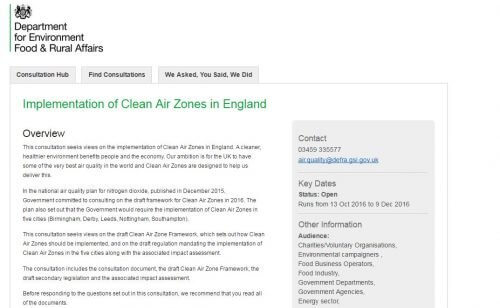
The Department for the Environment, Food and Rural Affairs (DEFRA) has launched a consultation into new Clean Air Zones, which will be required in five cities, Birmingham, Leeds, Nottingham, Derby and Southampton, by 2020.
These zones will be targeted at areas of the city where air quality problems are the most serious, to reduce the impact on people’s health and create cleaner and healthier environments.
The measures will focus on buses, taxis, coaches and lorries. Private car owners will not be affected.
Birmingham and Leeds will also discourage the most polluting diesel vans and implement other measures which may include Park & Ride schemes, changes in road layouts and provision of infrastructure for alternative fuels. Media sources reported that the measures in Birmingham may include the provision to give electric cars priority at traffic lights, the ability to drive on bus lanes and the ability to go the reverse direction on certain on-way streets in some situations. However, CBW was unable to confirm this from official sources.
A spokesman from Birmingham City Council told CBW: “We’re doing our own feasibility studies, as are each of the cities involved.
“We will implement the measures which best suit our particular needs.”
Following government-funded scoping studies, councils will further consult on the details of these zones next year. Local authorities will only be able to set charges at levels designed to reduce pollution, not to raise additional revenue beyond recovering the costs of the scheme.
In addition, applications are now open for councils to bid for a share of at least £3m as part of an Air Quality Grant to help improve air quality in their area.
Environment Minister Thérèse Coffey said: “We need to tackle air pollution and creating Clean Air Zones will improve the quality of life for people who live and work in our towns and cities, both now and in the future.
“Real progress has been made, but there is more to do, which is why we have also committed more than £2bn to greener transport schemes since 2011.”
INFO
To participate in the consultation, visit https://consult.defra.gov.uk/airquality/implementation-of-cazs

